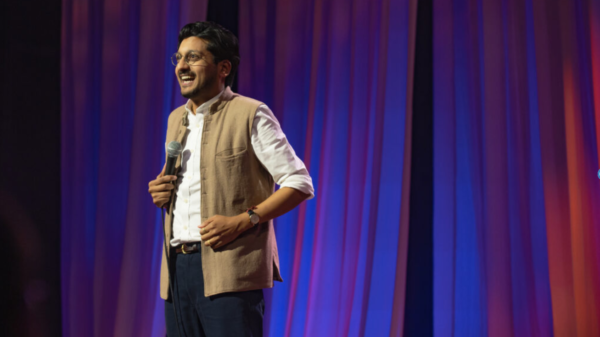Podcast Editor Matthew Seaman on dark humour and how it affects cancel culture today.
I am going to open with a quote from Ricky Gervais’ “Humanity” (Netflix):
“People take everything personally, they think the world revolves around them, particularly on Twitter. I’m not Tweeting anyone, I’m just Tweeting. I’ve got twelve million followers, I don’t know who’s following me, they can be following me without me knowing, choose to read my Tweet, and take that personally. That’s like going into a town square, seeing a big notice board, and there’s a notice: ‘guitar lessons’, and you go: ‘but I don’t f*****g want guitar lessons!’… Fine. It’s not for you then! Just walk away.”
After conducting an Instagram survey, amongst predominantly younger age groups, it is evident that there is a consensus regarding dark humour. Whilst many agreed that ‘anything can be taken the wrong way’, the recurring opinion is that ‘there is a line that must not be crossed’. With this in mind, I am going to explore exactly how comedian and satirist Ricky Gervais excuses his dark comedy, and how he, and many in his industry, justify their right to joke about any topic or theme.
As an audience, we must consider the difference between a ‘bad joke’ and an inappropriate comment, the subject versus the target of a joke, and the difference between a joke that is delivered in poor taste, and one that is simply received poorly. Gervais describes a joke as “people saying something they don’t really mean for comic effect – to elicit a laugh.” He goes on to observe that people tend to find offence in jokes when they mistake the “subject” of the joke with the “target”. He concludes that a joke “about race” is not necessarily a “racist joke”. In his opinion, there is no topic that cannot be joked about, and the only factor that really determines the appropriateness of a joke, is its target. To me – this makes perfect sense.
If a joke is shaming a victim of sexual assault, placing them at the heart of it, encouraging laughs at their expense, then of course it’s inappropriate and will naturally cause offence, and probably somewhat intends to do so. On the other hand, if the target of the joke is the rapist, and it is their bad nature, or a misunderstanding, that is being ridiculed, then I don’t see the issue. Of course it is a case by case basis that determines whether the joke is actually funny, and that is for the audience to decide, but I don’t think somebody should be penalised for joking about any particular topic. In Gervais’ interview with Sam Harris for his “Making Sense” podcast, he enforced that there are many ways that a joke about “the holocaust”, for example, can be okay, depending on what or who the target of the joke is.
It is also important that we remind ourselves that jokes are deliberately satirical and exaggerated. Whilst Jimmy Carr may make a distasteful joke about paedophilia, it does not automatically mean he is a paedophile. It may mean he has a twisted, unusual sense of humour, and nobody is insinuating his audience will necessarily receive it all in the same way, but he cannot be condemned for the topic itself. Niche comedy should be permitted its niche audience, without the angry majority shutting it down. On the whole, in the comedy genre, we are met with opinions and comments that the comedian usually doesn’t even believe or mean themselves.
The opposing argument would be that a joke about a sensitive topic could trigger negative responses in audiences that have experienced trauma. And whilst I completely respect that, and understand why some call for trauma to only be joked about by those who have lived through it, we do live in a country that is championed for its freedom of speech. Of course this can, and has, been taken too far in the past, with extreme right wing organisations using it to their advantage, but we are talking about *comedy*, not political views.
In the highly acclaimed Netflix series “Afterlife”, Gervais’ grieving character: Tony, exits a comedy club feeling deflated, complaining that the comedian made a joke about suicide. Tony’s friend turns to him and says: “The joke wasn’t about you, Tony, it didn’t happen. He made it up, he doesn’t know your situation. He didn’t say ‘hands up whose wife has died,’ and then went ‘here’s a joke for you’…”. For me, this encapsulates what dark comedy is about. It may not always be the right time and place, not every audience member will be in the right mood for it, but you cannot censor artists for unintentionally causing offence.
If we ‘cancelled’ an artist every time somebody is offended, we would have nothing left to laugh at. Ultimately, it’s important to consider that just because we don’t want those guitar lessons, it doesn’t mean they should necessarily stop happening all together. A joke delivered in poor taste may be a bad joke, but the person behind the joke is not automatically a criminal for touching a nerve. Whilst their execution of the joke is key, so is our receipt of it, and nobody is being forced to follow that controversial person on Twitter. Just as Ricky Gervais has the freedom to make a joke about war, you have the right to walk away, and find an alternative form of entertainment. Although many comedians and public figures are simply controversial for the sake of being controversial, if it is in the spirit of humour, and has a healthy target, then I don’t see the harm.
















